Travel Apps: Top 7 Trends to Watch in 2024
 Gabriel Kuriata
Gabriel Kuriata  Gabriel Kuriata
Gabriel Kuriata Travel. Together with Dating, Food & Drinks, it’s one of the three categories of mobile apps designed to make you go out, explore, and meet people. Technically, we could include Weather here, but apps from this category may sometimes have the opposite effect ;)
The category is as diverse as the travel industry itself. Mobile apps are offered by independent publishers, hotel networks, travel agencies, airlines, coach operators, and many other tourism companies. However, the functionality of apps from this category can be roughly divided into these areas:
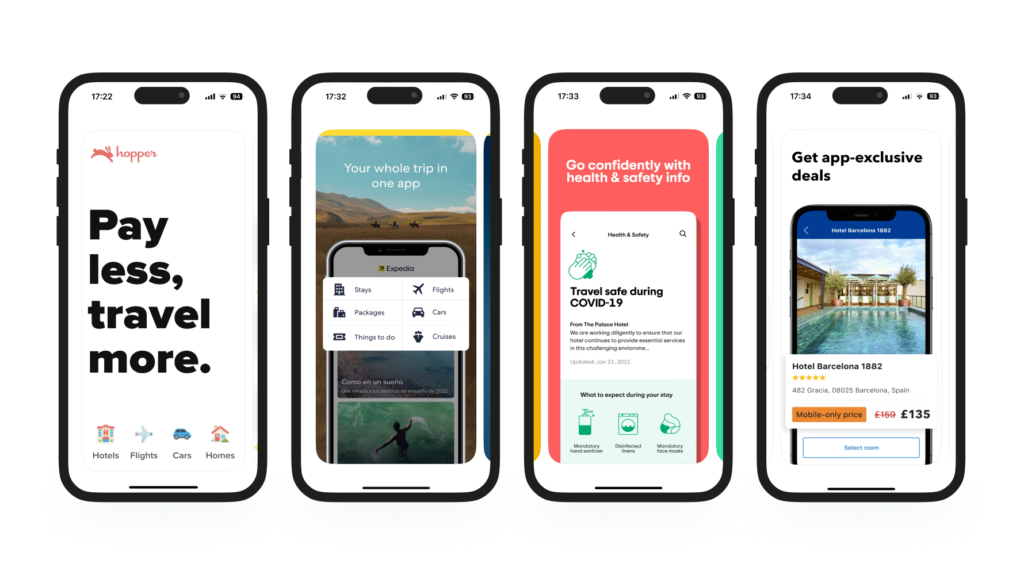
Booking, planning & preparation: from booking of hotel rooms (or any other type of accommodation), and tickets for planes, trains, and boats, to compiling must-see lists of local attractions. You may also add a handful of useful tools for exploring the outside world (like currency calculators and local safety information). Apps like Booking.com, Tripadvisor, Expedia, AirBnB and a multitude of others will either enable you to feel like a local, moving safely and efficiently around with accommodation and other necessities secured… or grab a last-minute deal and just take the most out of life (Carpe Diem ;) ).
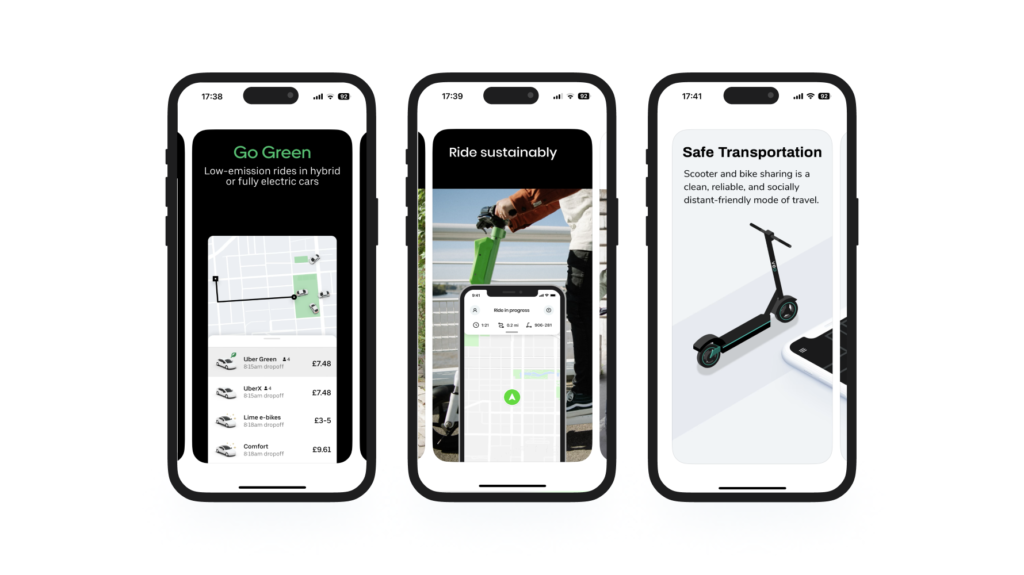
Getting you from point A to point B: from public transport assistance to electric scooters, bikes, car rentals, or ride-hailing – apps like Uber, Lyft, BlaBla Car, Bird, and Lime will make sure you get to your destination quickly & safely (provided you wear a helmet). Though crucial to the local populace, one can’t deny the importance of these apps for tourists. Just take a walk through your city in the summer and count all the people with backpacks and belt sachets moving around on city bikes and scooters (or being parked outside any recognized sightseeing point).
At first, these functionalities may seem far apart, but they have one thing in common: travel apps make the outside world easier to navigate and more pleasant to experience. This has colossal implications for the condition of the category and key industry trends impacting mobile apps from this category.
Digital transformation and the dominance of mobile apps disrupted the tourism industry and how we move around. Now, the travel business and mobile apps can’t exist without each other.
It’s impossible to discuss the future of the category without the real-world context. The economy, inflation, travel restrictions, and local safety precautions have a tremendous impact on the condition and adoption of mobile apps for traveling and transportation.
The Travel category of apps is tied closely to life in the real world and influenced by external factors beyond their control more than other categories.
Let’s look back at 2023 first: with few exceptions (China being a notable example, still implementing strict policies at the end of the year), most countries lifted any remaining travel restrictions related to the Covid-10 pandemic. Throughout the year, we got our freedom back and Travel apps took notice.
In financial terms, the outlook for Travel apps in 2024 is positive: according to Statista Digital Market Outlook, revenue generated from travel apps worldwide is expected to rise steadily in the following years, reaching over 533 million U.S. dollars in 2027.
This is even though travel expenses & recreation are among the first to be cut in case of tightening budgets. High costs of living and inflation will be an important factor in shaping the market in 2024. Skyscanner’s travel trends report for 2024 released at the end of 2023 confirms what’s logical in such circumstances: those of us with just enough funds to go anywhere will seek to make more informed decisions when it comes to spending. For many, traveling will become price-driven. Just take a look at the industry’s top booking app Hopper (number #2 in the Travel category on the App Store).
However, this still leaves a sizable population of customers with money and time (or in many cases – just time) at their hands to seek some truly unique, life-changing experiences.
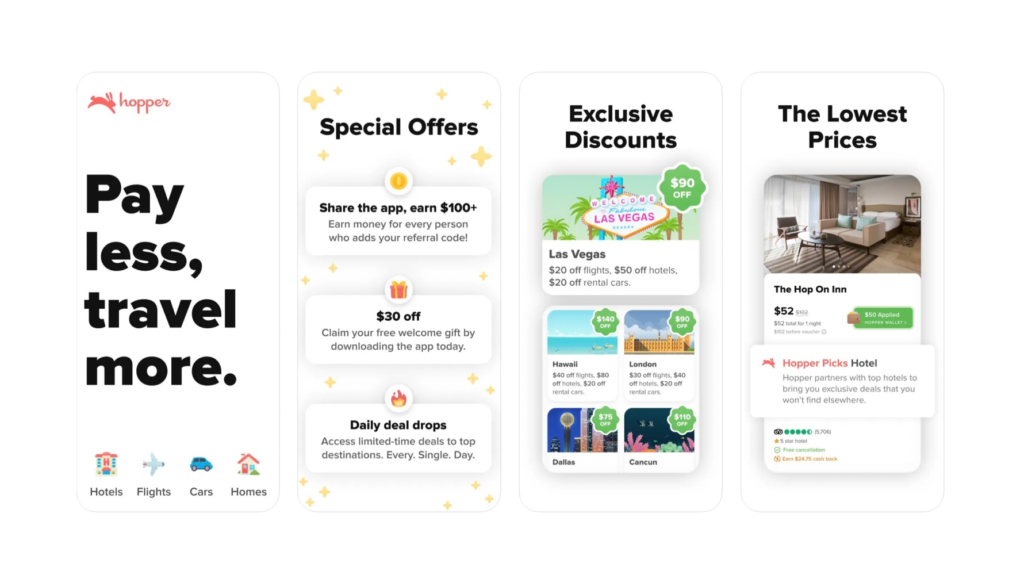
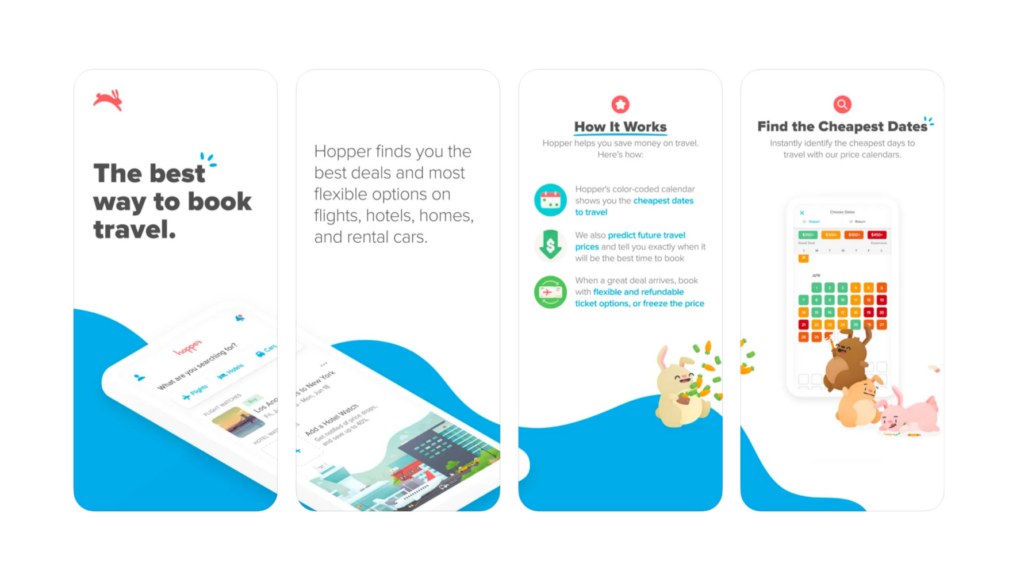
How does the world of economy and politics shape the attitudes and mindsets of travelers? Travel Predictions 2024, the most recent report released by Booking.com gives us many insights into the minds of travelers.
First of all, it showcases how significant unique experiences have become. According to the report, more than half of travelers are willing to stray off the beaten path and move forward without a plan, adapting to the situation as they go. What’s more 52% of travelers want to book trips where the destination remains a mystery until they arrive.
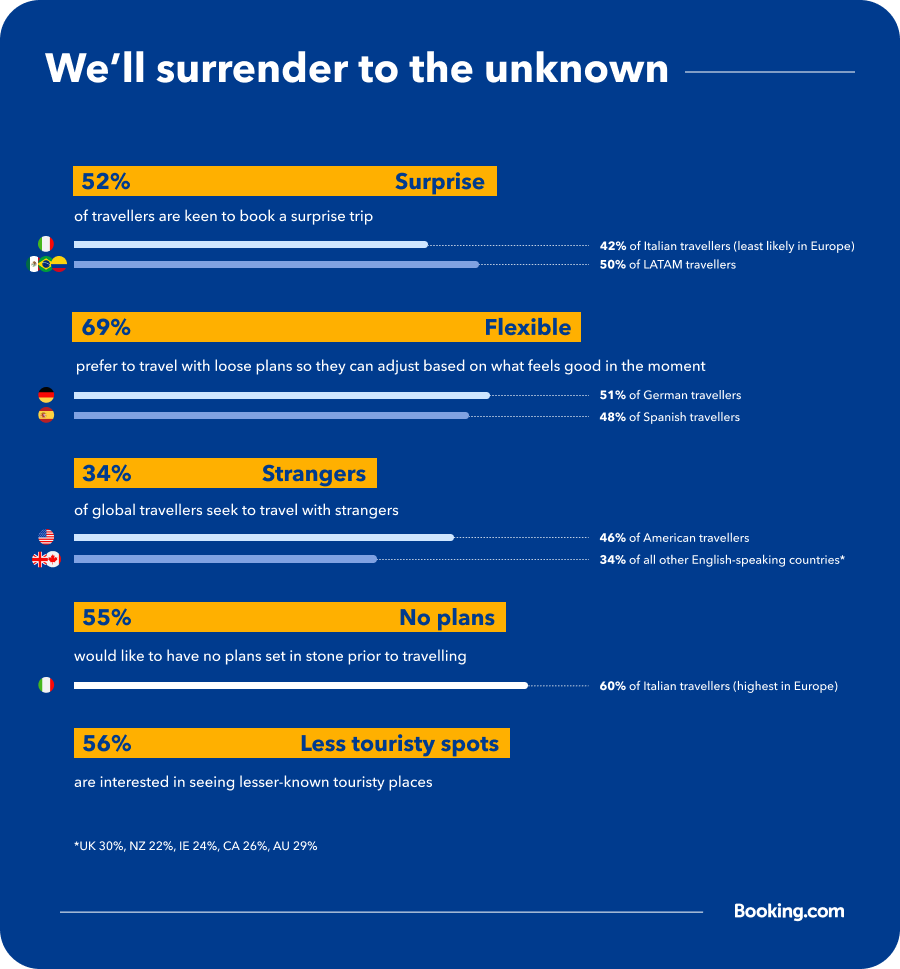
Booking.com predicts that AI is set to become a mainstream feature of travel next year. AI indeed seems like the only viable technology to deliver the necessary level of personalization at scale, as it’s capable of giving general advice to those seeking inspiration and providing precise destinations to those who made up their minds.
AI will also be able to handle the increasing scope of travelers’ interests and concerns. For example, they will be even more conscious about the environmental impact and safety of their experiences. This is evidenced in apps’ messaging shown before in this article and confirmed by data from the report that states that travelers do want to make eco-friendly decisions and expect app rewards for making them (by 60% of studied respondents).
Other subcategories of apps from the Travel category are also affected by external factors. Tightening budgets and high gas prices encourage car sharing. Lower car ownership among millennials may boost car-hailing and car-sharing services, according to a report by Reportlinker.
The growth of apps for renting electric bikes & scooters is the direct result of cities being overcrowded and difficult to move through. These services can provide alternative transportation to those living on a tight budget.
What is the main takeaway from all this data? Flexibility, responsiveness, and personalization will be key to handling the rising population of cost-conscious customers who at the same time seek something new, different, and unique.
These market factors and realities directly affect the trends for apps from this category that we think will dominate app development and creative direction in 2024.
AI will emerge as the absolute key component of Travel mobile apps in 2024. The report by Booking.com highlights this: solo travel is booming, with 59% of respondents looking to venture alone…
…only if we don’t count that artificial friend in their pockets ;).
Here’s our perspective of a company whose ecosystem of services helps mobile apps grow, acquire users, and optimize their online presence. The infographic below reflects the condition of the category and indirectly confirms what’s been said about the travel industry in general:
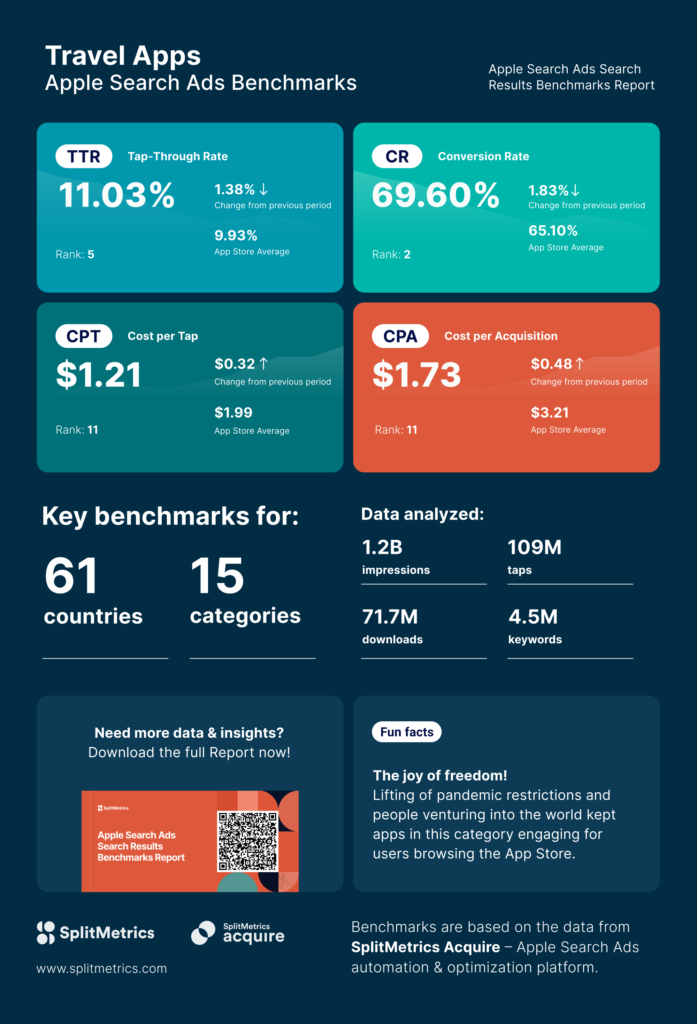
There are reasons to be optimistic about the outlook for travel apps, but we must keep in mind that a lot depends on their ability to deliver a seamless experience that truly helps to navigate the real world. Travel apps enjoy an average high conversion rate on the App Store, meaning that people are willing to experiment with new services. At the same time, costs of user acquisition (in terms of taps and installs) aren’t the highest when compared to other categories (although they are rising from their pandemic decline).
To summarize: our data indicates a good general outlook and that the time to act is now. Take our predictions for travel apps and make 2023 the best year so far!
Do you like the data you see for travel apps on the infographic? Download the full report and see much more! We’ve analyzed over 4.5M keywords, 1.2B impressions, 109M taps, and 71.7M downloads to give you Apple Search Ads paid search results benchmarks for 15 categories and 61 markets.
Marketing budgets are among the first expenses to be cut in the face of market uncertainty and rising costs of business operations. Apple Search Ads search results benchmarks are therefore a good indicator of what’s to be expected in a given market. What we see fills us with optimism, but as evidenced by travel app market trends – growth will require the full embrace of paid user acquisition and app store optimization efforts.
Find out how Flyin.com reduced their cost per acquisition by 15% with SplitMetrics Acquire. Flyin.com is the first and only “Online Travel Agency” in the Middle East that offers integrated travel services and helps create the best possible trip for over 50,000 travelers daily.
Taking into account the unique functionalities of travel apps, market conditions, and outlook for 2023 as well as our own data, we picked these trends to look out for and react to.
Better personalization of offers & user experience is key to handling a diverse, segmented market. Customers want such offers and they are willing to pay for them.
Hunters want access to exclusive and quick deals. Planners expect a streamlined and seamless experience. Those with resources will want to be sure that all their needs are met. Those cost-conscious will cherish the ability to fully control their expenses.
Do two separate groups of users want different things from the same app? Read the case study of tonestro to see how they handled this issue with the help of custom product pages.
Only sophisticated algorithms are capable of delivering such perfectly tailored offers to the individual preferences of users. Good analytics & first party data acquisition will be absolutely essential, especially given the rise of the second major trend among mobile app users…
Fun fact: users desire those personalized offers but don’t want to share the data necessary to create them. This is a problem not only for travel apps but online marketing in general.
There’s only one safe option out of this predicament: a company has to rely on its data in crafting its user experience and offers. To do that, you need a strategy and focus on user experience. If the value proposition is perfectly clear and a certain level of transparency is reached, the chances of the algorithm picking relevant offers are much higher.
You need to have a good first data acquisition strategy, to ask just for the right amount of data necessary to deliver that seamless and fitting experience. Great user experience is key to achieving this.
Traveling is a way of life and by definition, every subcategory of travel apps is designed with long-term and possibly frequent use in mind. For those who are truly willing and have the resources to embrace this lifestyle, a premium plan or a subscription model is a viable option. Results, various data and reports by eDreams ODIGEO (one of the world’s largest online travel companies) and its prime subscription program are a fine example of this trend. Hopper, the very successful app mentioned before, is launching a premium subscription too, offering a wide range of benefits for 9.99% a month in the foreseeable future.
With an optimistic outlook and declarations of keeping the same level or increasing travel, it’s viable for apps to introduce premium subscription plans. Any app in fact, meant to be used daily has the potential for subscriptions as a monetization strategy.
Whether this means getting rid of ads to smoothen the overall experience and efficiency of planning & booking or exclusive access to timed offers – we expect subscription plans will become more prominent in the category.
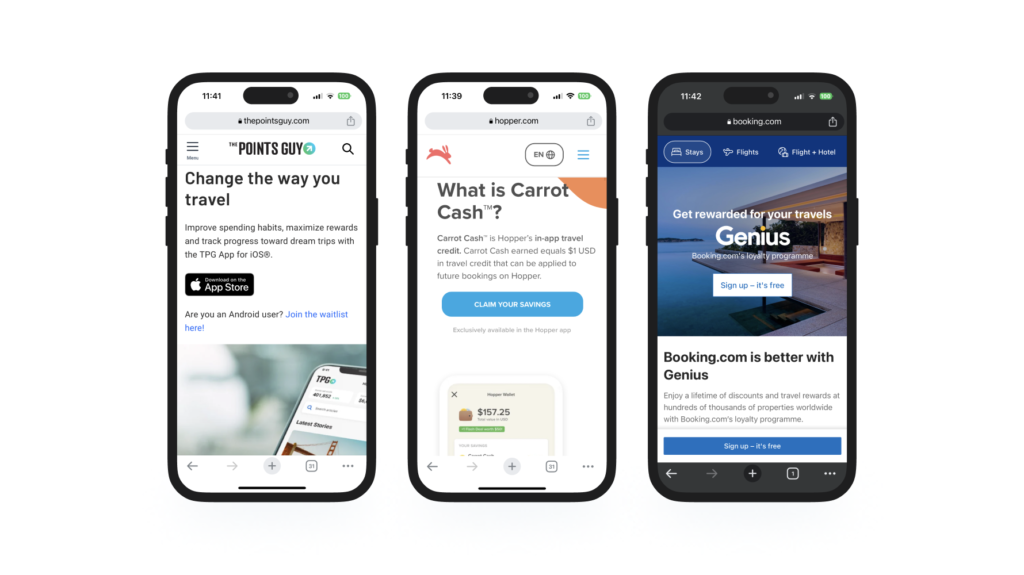
Hopper has Hopper Wallet for Carrot Cash, TPG App implements a points system (TPG stands for The Points Guy), Booking.com has a loyalty program called Genius, Uber uses rewards (for both rides & those ordering them), Expedia introduced them in 2022… and so on. Airbnb comes to mind as one of the few travel apps without some form of a loyalty program or a subscription strategy (as of now at least).
Most apps & travel services have loyalty programs, but there’s always room for improvement, as calls for personalized experiences put attention to varying expectations of target demographics.
Carrots, points, rewards… options are plentiful. Remember, that many customers are looking for more than transactional benefits.
Given this data, a good algorithm able to predict and deliver a perfectly tailored offer can do wonders for the app’s revenue.
We mentioned this trend already in our article on Mobile Trends. Here’s a brief reminder of what Super Apps are:
Super Apps is a term for large mobile applications that integrate multiple functionalities, thus replacing several smaller, separate apps.
From a technical perspective, a super app may be a collection of several mini-apps hiding behind a robust and (hopefully) frequently customizable interface, allowing for the accomplishment of a multitude of diverse tasks.
Seamless experience is the goal and by very definition, Super Apps are designed to accomplish that. From planning & preparation, to getting you to the place with comfortable navigation, to taking care of all the payments. Mobile payments, mobile wallets are key among all the features new apps need to introduce.
Given all the economic factors and user preferences, Super Apps seem like a natural direction for travel apps to evolve into.
Artificial intelligence is the only technology capable of delivering mass personalization and handling the scope of conversations demanded by travelers today. No human-powered help center will be capable of conducting countless conversations, with topics ranging from sustainability to authenticity of local dishes – and those overlooked by many so far. No wonder that more mobile apps are investing in this technology.
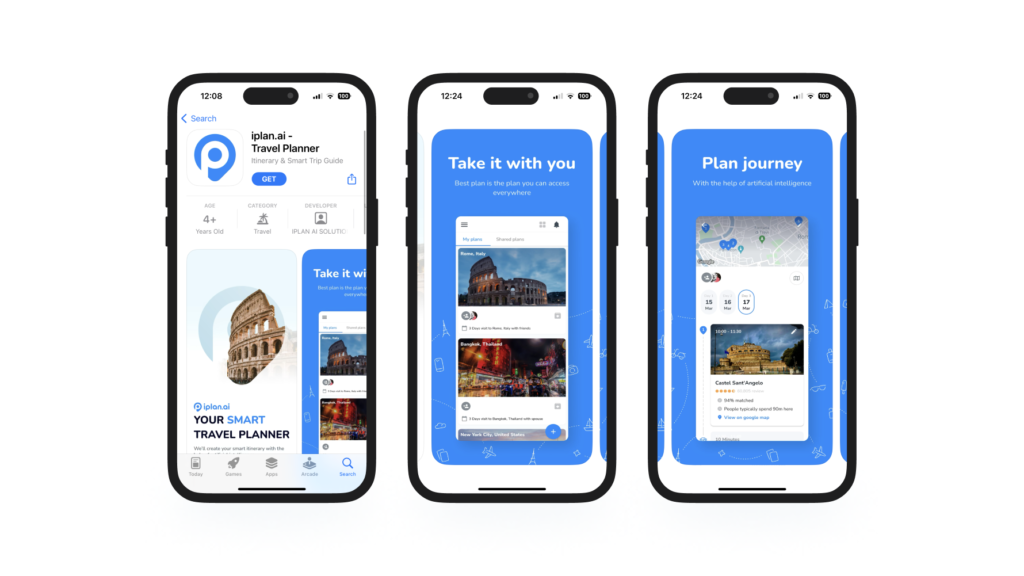
Even more AI-based and optimized for travel companies solutions keep popping up. The technology is becoming more available for businesses of varying sizes. With limited manpower and an ever-increasing pressure on personalization, a robot might be the only viable option for providing a smooth and less stressful user experience.

There is nothing more disruptive than AI right now — even in mobile marketing. Regardless of how you feel about AI, it’s wise to know its strengths and weaknesses. Read about them in our article “Mobile Marketing Meets AI: New Possibilities with ChatGPT”.
Mobile apps truly disrupted the historically desktop-oriented travel industry. We indeed see constant growth of mobile apps and their evolution into Super Apps is very likely.
Progressive web apps use your browser and web technologies to deliver an app-like experience to users of websites. Visitors can place a shortcut to the website on their desktop and use it like an app later – even in offline mode.
From a user’s perspective, it’s a great solution to poor internet connectivity – a common problem of people traveling abroad and relying on mobile data transfers.
From a travel company’s perspective, progressive web apps can be a viable alternative to native apps. This may be the case for travel companies whose services aren’t used regularly enough to warrant an investment in a full-blown app, as well as those businesses with established websites enjoying large traffic.
As a result, it’s no surprise that progressive web apps are present in Asian markets. Brands such as Trivago accomplished fantastic results with its PWA (as observed by Google). For some, a progressive web app may be a transitional solution, as users may ultimately shift to a native app, thanks to well thought out loyalty programs, subscription models and proliferation of higher end smartphones (as of 2023, Trivago has a successful native app on the App Store).
Nevertheless, progressive web apps are a thing to keep your eye on. It’s a tech with the potential to cause some market disruption by smaller businesses. There’s an interesting case of MakeMyTrip implementing this tech (keep in mind that they also have a prominent app on the App Store).
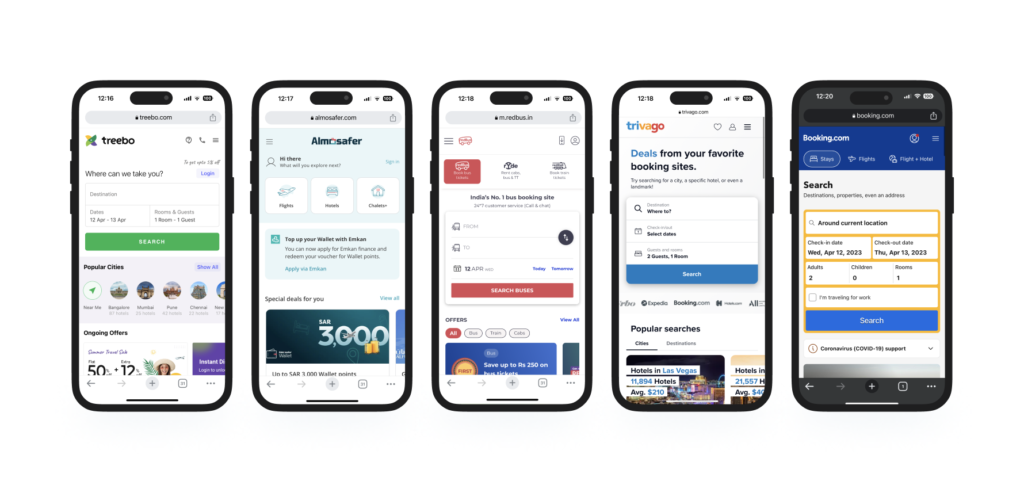
Many new powerful brands are mobile-only and mobile apps are their primary means of doing business. Progressive Web Apps are a tech that can be a milestone for a company, not abandoning its roots and acquired customer base. Simply put, progressive web apps are a low-cost evolution of mobile websites.
The trends we picked are worth keeping an eye on not only because of their potential for development or setting of new business objectives but of their direct and immediate impact on travel apps user acquisition and marketing strategies.
Personalization of experiences, new important features, and strikingly different preferences among customers show how important certain mobile marketing solutions and tools will inevitably be for travel apps in 2023.
The importance of personalization and gathering of first-party information on the app’s target audience highlights the role of A/B testing as a key tool in evaluating what features attract new users best and what drives the decisions of various target groups.
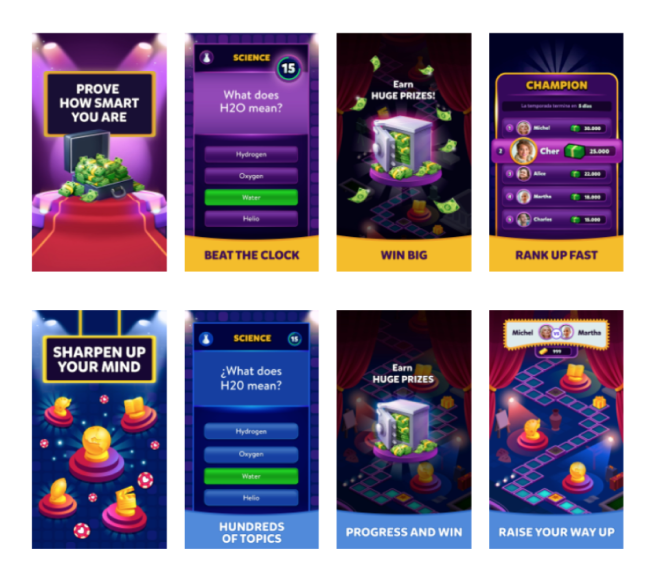
Another key tool of user acquisition and personalization are custom product pages. You can use them to highlight specific features of your app, test different value propositions and introduce seasonal campaigns or re-engage your audience.
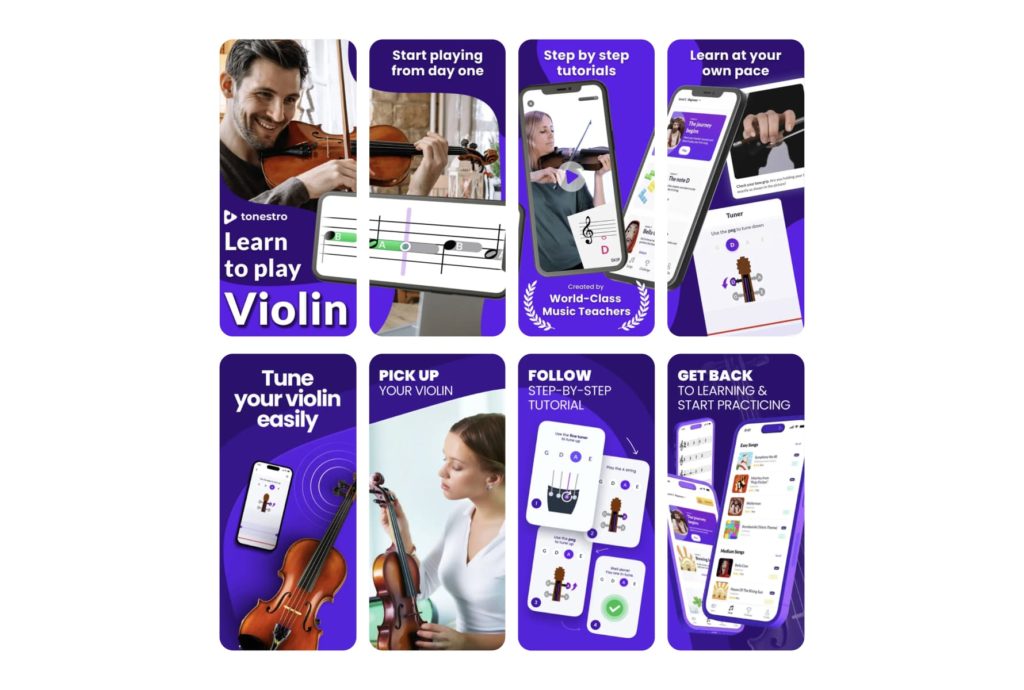
Relying solely on appropriate creatives you can effectively segment your audience (by testing their reaction to them). Using your icons, screenshots, and other elements you can conduct demographic, psychographic, geographical, behavioral, and even needs-based or value-based segmentation.
Custom product pages can also help you optimize your ads for specific markets, taking into account mentality and cultural differences. A surely important aspect of apps from the travel category.
To finally wrap up: personalized offers, new monetization plans, new functions, and means of engaging users… if that doesn’t mark 2023 the year of app store optimization, custom product pages, and A/B testing and validation then we seriously don’t know what will ????
Either way, we’re ready to immediately help you take immediate action to take the most out of 2023.
